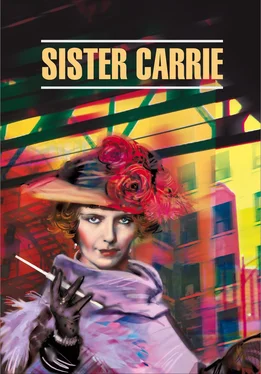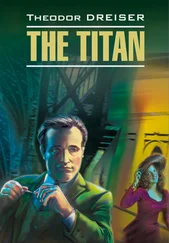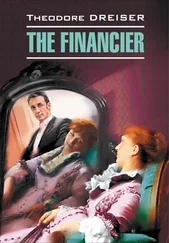1 ...7 8 9 11 12 13 ...23 “I want to see something,” said Carrie, and by the tone she put into the last word they realized for the first time she was not pleased with them.
“What’s the matter with her?” asked Hanson, when she went into the front room to get her hat.
“I don’t know,” said Minnie.
“Well, she ought to know better than to want to go out alone.”
Carrie did not go very far, after all. She returned and stood in the door.
There came a day when the first premonitory blast of winter swept over the city. It scudded the fleecy clouds in the heavens, trailed long, thin streamers of smoke from the tall stacks, and raced about the streets and corners in sharp and sudden puffs. Carrie now felt the problem of winter clothes. What was she to do? She had no winter jacket, no hat, no shoes. It was difficult to speak to Minnie about this, but at last she summoned the courage.
“I don’t know what I’m going to do about clothes,” she said one evening when they were together. “I need a hat.”
Minnie looked serious.
“Why don’t you keep part of your money and buy yourself one?” she suggested, worried over the situation which the withholding of Carrie’s money would create.
“I’d like to for a week or so, if you don’t mind,” ventured Carrie.
“Could you pay two dollars?” asked Minnie.
Carrie readily acquiesced, glad to escape the trying situation, and liberal now that she saw a way out. She was elated and began figuring at once. She needed a hat first of all. How Minnie explained to Hanson she never knew. He said nothing at all, but there were thoughts in the air which left disagreeable impressions.
The new arrangement might have worked if sickness had not intervened. It blew up cold after a rain one afternoon when Carrie was still without a jacket. She came out of the warm shop at six and shivered as the wind struck her. In the morning she was sneezing, and going down town made it worse. That day her bones ached and she felt light-headed. Towards evening she felt very ill, and when she reached home was not hungry. Minnie noticed her drooping actions and asked her about herself.
“I don’t know,” said Carrie. “I feel real bad.”
She hung about the stove, suffered a chattering chill, and went to bed sick. The next morning she was thoroughly feverish.
Minnie was truly distressed at this, but maintained a kindly demeanour. Hanson said perhaps she had better go back home for a while. When she got up after three days, it was taken for granted that her position was lost. The winter was near at hand, she had no clothes, and now she was out of work.
“I don’t know,” said Carrie; “I’ll go down Monday and see if I can’t get something.”
If anything, her efforts were more poorly rewarded on this trail than the last. Her clothes were nothing suitable for fall wearing. Her last money she had spent for a hat. For three days she wandered about, utterly dispirited. The attitude of the flat was fast becoming unbearable. She hated to think of going back there each evening. Hanson was so cold. She knew it could not last much longer. Shortly she would have to give up and go home.
On the fourth day she was down town all day, having borrowed ten cents for lunch from Minnie. She had applied in the cheapest kind of places without success. She even answered for a waitress in a small restaurant where she saw a card in the window, but they wanted an experienced girl. She moved through the thick throng of strangers, utterly subdued in spirit. Suddenly a hand pulled her arm and turned her about.
“Well, well!” said a voice. In the first glance she beheld Drouet. He was not only rosy-cheeked, but radiant. He was the essence of sunshine and good-humour.
“Why, how are you, Carrie?” he said. “You’re a daisy. Where have you been?”
Carrie smiled under his irresistible flood of geniality.
“I’ve been out home,” she said.
“Well,” he said, “I saw you across the street there. I thought it was you. I was just coming out to your place.”
How are you, anywhere?”
“I’m all right,” said Carrie, smiling.
Drouet looked her over and saw something different.
“Well,” he said, “I want to talk to you. You’re not going anywhere in particular, are you?”
“Not just now,” said Carrie.
“Let’s go up here and have something to eat. George! but I’m glad to see you again.”
She felt so relieved in his radiant presence, so much looked after and cared for, that she assented gladly, though with the slightest air of holding back.
“Well,” he said, as he took her arm – and there was an exuberance of good-fellowship in the word which fairly warmed the cockles of her heart. [25] “Well,” he said, as he took her arm – and there was an exuberance of good-fellowship in the word which fairly warmed the cockles of her heart. – Ну, – сказал он, беря ее под руку, и в тоне его было столько простого товарищеского чувства, что у девушки стало тепло на душе.
They went through Monroe Street to the old Windson dining-room, which was then a large, comfortable place with an excellent cuisine and substantial service. Drouet selected a table close by the window, where the busy route of the street could be seen. He loved the changing panorama of the street – to see and be seen as he dined.
“Now,” he said, getting Carrie and himself comfortably settled, “what will you have?”
Carrie looked over the large bill of fare which the waiter handed her without really considering it. She was very hungry, and the things she saw there awakened her desires, but the high prices held her attention. “Half broiled spring chicken – seventy-five. Sirloin steak with mushrooms – one twenty-five.” She had dimly heard of these things, but it seemed strange to be called to order from the list.
“I’ll fix this,” exclaimed Drouet. “Sst! waiter.”
That officer of the board, a full-chested, round-faced negro, approached, and inclined his ear.
“Sirloin with mushrooms,” said Drouet. “Stuffed tomatoes.”
“Yassah,” assented the negro, nodding his head.
“Hashed brown potatoes.” [26] Hashed brown potatoes. – Жаренный картофель.
“Yassah.”
“Asparagus.”
“Yassah.”
“And a pot of coffee.”
Drouet turned to Carrie. “I haven’t had a thing since breakfast.
Just got in from Rock Island. I was going off to dine when I saw you.”
Carrie smiled and smiled.
“What have you been doing?” he went on. “Tell me all about yourself. How is your sister?”
“She’s well,” returned Carrie, answering the last query.
He looked at her hard.
“Say,” he said, “you haven’t been sick, have you?”
Carrie nodded.
“Well, now that’s a blooming shame, isn’t it? You don’t look very well. I thought you looked a little pale.
What have you been doing?”
“Working,” said Carrie.
“You don’t say so! At what?”
She told him.
“Rhodes, Morgenthua and Scott – why I know that house.
Over here on Fifth Avenue, isn’t it? They’re a close-fisted concern.
What made you go there?”
“I couldn’t get anything else,” said Carrie frankly.
“Well, that’s an outrage,” said Drouet. “You oughtn’t to be working for those people. Have the factory right back of the store, don’t they?”
“Yes,” said Carrie.
“That isn’t a good house,” said Drouet. “You don’t want to work at anything like that, anyhow.”
“So you lost your place because you got sick, eh?” he said.
“What are you going to do now?”
Читать дальше












